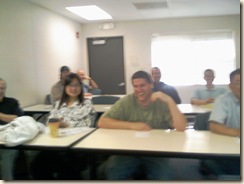Scott Hanselman had a nice
post in response to
Jeff Atwood's
post in response to
Alastair Rankine's post
"Blogging Horror". I don't feel the need to comment on
Coding Horror beyond saying that I
occasionally find some real jewels there. Good stuff for free.
But Scott's post struck a nerve. Here's some context.
I've been contemplating presenting at the local code camp for years now, but have never gotten around to actually doing it. I'd always figured that I should pick a topic on which I could speak with some authority. Makes sense I thought, but I was never able to pick one that moved me.
Localization is a nice, well circumscribed topic that I have engaged pretty thoroughly over the years. I have some hard earned experience, useful code and guidance borne of long hours. But I really find it difficult to care enough to put it all together into something that wouldn't risk being a waste of someone's time. So I've never done it.
The list of sessions for the code camp was posted a few weeks ago, and I'd been thinking that it would have been nice to see more and new sessions that addressed issues like
SRP and
OCP and
Dependency Injection and other principles of good design. Maybe you've seen this coming, but I realized could do that session I wanted. Certainly then it would be on something that I actually cared about.
Of course the thing that's kept me from even considering it before is that I'm still learning, and still have a lot to learn. But I figured there's no reason that I can't do it based on my own struggles to make my code better.
I finally decided a week ago that I was actually going to do it. This past week's free time has been spent on reviewing literature, searching for good examples, and trying to make sure I've covered all the bases. I woke up at 4:30AM this morning and finally had the scenario for a good example. It was such a nice scenario that I couldn't get back to sleep.
So after I'd finished documenting my example this morning, it was really nice to see Scott's post about Jeff''s post about Alastair Rankine's post. Here's the best bit:
We're all just learning together. I started blogging so I could Google myself later, that's all. I taught as an adjunct professor so I could know the topics better as there is no better way to learn a thing deeply than to teach it. I worked on a few books so I could really dig deep, but I'm the first guy to say "dude, I have no idea." My brain bit-rots as yours does.
That is a nice bit of encouragement, isn't it?
Counting down four more weeks until the code camp and I don't even know if it is still open for submissions (hope so), but I'm going to do the work regardless of whether I can get in under the deadline. If I do it, you'll read about it here. But if I don't (and probably even if I do) it will all eventually find its way here.
We'll see what I can do . . .

